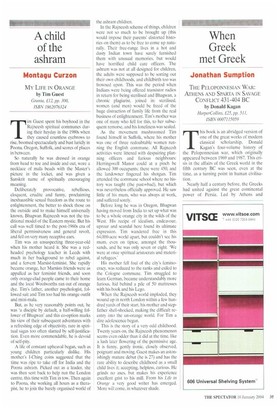A child of the ashram
Montagu Curzon
MY LIFE IN ORANGE by Tim Guest Granta, £12, pp. 300, ISBN 1862076324 Tim Guest spent his boyhood in the Rajneesh spiritual communes during their heyday in the 1980s when they caused countless eyebrows to rise, boomed spectacularly and bust luridly in Poona. Oregon, Suffolk, and scores of places in between.
So naturally he was dressed in orange from head to toe and inside and out, wore a necklace of mala beads with the Master's picture in the locket, and was given a Sanskrit name of spiritually encouraging meaning.
Deliberately provocative, rebellious, eloquent, erudite and funny, proclaiming inexhaustible sexual freedom as the route to enlightenment, the better to shock those on the outside and to make himself universally known. Bhagwan Rajneesh was not the traditional model of the Eastern mystic. But his call was well timed to the post-1960s era of liberal permissiveness and general revolt, and fell on very many receptive ears.
Tim was an unsuspecting three-year-old when his mother heard it. She was a redheaded psychology teacher in Leeds with much in her background to rebel against, and a fervent Marxist-feminist. She rapidly became orange, her Marxists friends were as appalled as her feminist friends, and soon only orange-clad people came to their home and the local Woolworths ran out of orange dye. Tim's father, another psychologist, followed suit and Tim too had his orange outfit and mini-mala.
But, as he very reasonably points out, he was 'a disciple by default, a half-willing follower of Bhagwan' and this co-option marks his view of their subsequent adventures with a refreshing edge of objectivity, rare in spiritual sagas too often slanted by self-justification. Even more commendable, he is devoid of self-pity.
A life of constant upheaval began, such as young children particularly dislike. His mother's I-Ching coins suggested that the time was ripe to take off for India and the Poona ashram. Picked out as a leader, she was then sent back to help run the London centre, this time with Tim in tow. Then again to Poona, she working all hours as a therapist, he to join the barely organised world of the ashram children.
In the Rajneesh scheme of things, children were not so much to he brought up (this would impose their parents' distorted histories on them) as to be free to come up naturally. Their free-range lives in a hot and dusty Indian town have surely furnished them with unusual memories, but would have horrified child care officers. The ashram was not at all designed for children, the adults were supposed to be sorting out their own childhoods, and childbirth too was frowned upon. This was the period when Indians were being offered transistor radios in return for being sterilised and Bhagwan, a chronic plagiarist, joined in: sterilised, women (and men) would be freed of the huge distraction of family life from the real business of enlightenment. Tim's mother was one of many who fell for this, to her subsequent remorse, and his loneliness was sealed.
As the movement mushroomed Tim found himself in Suffolk, where his mother was one of three redoubtable women running the English commune. All Rajneesh activities were littered with despairing planning officers and furious neighbours: Herringswell Manor could at a pinch be allowed 300 occupants; there were 450, and the landowner fingered his shotgun. Tim attended the commune school where no history was taught (the past=bad), but which was nevertheless officially approved. He saw little of his mum, who was always at work, and suffered sorely.
Before long he was in Oregon, Bhagwan having moved from India to set up what was to be a whole orange city in the wilds of the West. His recipe of idealism, endeavour, uproar and scandal here found its ultimate expression. Tim wandered free in this 64,000-acre world apart, but couldn't see his mum, even on tiptoe, amongst the thousands, and he was only seven or eight. 'We were at once spiritual aristocrats and material refugees.'
His mother fell foul of the city's feminocracy, was reduced to the ranks and exiled to the Cologne commune, Tim struggled to learn German, became understandably more furious, hid behind a pile of 50 mattresses with his book and his Lego.
When the Rajneesh world imploded, they wound up in north London within a few hundred yards of their start, his mother and stepfather shell-shocked, making the difficult reentry into the un-orange world. For Tim a dire adolescence began.
This is the story of a very odd childhood. Twenty years on. the Rajneesh phenomenon seems even odder than it did at the time, like a lush later flowering of the permissive age. It is funny, gently ironic, closely observed, poignant and moving. Guest makes an astonishingly mature debut (he is 27) and has the rare ability to describe childhood as a small child lives it; accepting, helpless, curious. He grinds no axes, but makes his experience excellent grist to his mill. From his Life in Orange a very good writer has emerged. More will come, in whatever shade.


























































 Previous page
Previous page